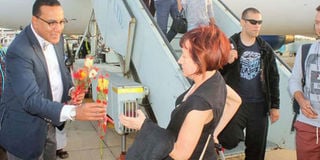Don’t get detracted by personal spats but strive to revive tourism

Tourism Cabinet Secretary Najib Balala welcomes tourists upon their arrival at Moi International Airport in Mombasa, last year. PHOTO | FILE | NATION MEDIA GROUP
What you need to know:
Mr Balala has been a key figure in the tourism sector for some years with his origins particularly in Coast tourism.
Dr Leakey is credited with bringing poaching under control years ago and has had several stints at KWS.
Mr Balala has worked tirelessly at reviving the fortunes of Kenya’s tourism industry, which has been through some gruelling times.
At first glance, the spat between Tourism Cabinet Secretary Najib Balala and former Kenya Wildlife Service chairman Richard Leakey is akin to an argument between two bull elephants.
Mr Balala has been a key figure in the tourism sector for some years with his origins particularly in Coast tourism. Aside from his paleontology, Dr Leakey is credited with bringing poaching under control years ago and has had several stints at KWS.
Both are quick to state their minds, show their no-nonsense traits and irritation with the vagaries and inadequacies of the system. So what has gone wrong this time round?
At first it was to do with rhinos dying during relocation. Now it has turned into something much larger and arguably uglier.
Mr Balala is putting much of the blame at Dr Leakey’s doorstep, accusing him of influencing donors to withhold money from KWS.
SLOW DOWN ASSISTANCE
It is correct that Dr Leakey has had a close affinity with some donors over the years and so it is an open question as to whether he has used that to deny or slow down the much-needed assistance to KWS. Having interacted with him on an off over the years, I would certainly vouch for the fact that he likes to get his way and push his influence as and when.
Mr Balala has worked tirelessly at reviving the fortunes of Kenya’s tourism industry, which has been through some gruelling times. Arrivals last year were still 20 per cent less than in the peak year of 2011 and most hotels have a lot of spare capacity.
Let us not be modest about it. Kenya has an amazing variety of attractions — from its coastline and lakes to scenery and savannahs to wildlife. The last one is concentrated in the 20 or so game parks and wildlife sanctuaries.
Tourism is one of the pillars of the economy, having earned the country Sh120 billion last year as tea and horticulture exports brought in Sh129 billion and Sh115 billion, respectively. It is one of the top-four foreign exchange earners if one includes diaspora remittances.
RIPPLE EFFECT
Considering that much of the tourism industry is working well below capacity, it has the potential to become the leading foreign exchange earner.
There are two other points to be borne in mind. The ripple effect of tourism is enormous because, besides offering direct employment, it supports a lot of other formal and informal jobs in the agriculture and service sectors all over the country.
Kenya and its two major cities, Nairobi and Mombasa, are regional hubs. Mombasa port serves cargo going to Uganda, Rwanda and eastern Congo. Many regional operations have their bases in Nairobi and create enormous employment opportunities.
So, as a country, we should not get hung up with personal or egotistical issues but look at the bigger picture and see how we can get our tourism working better and to fuller capacity.
I recently asked some colleagues from the Coast where they would suggest I visit next. The reply was, “Go to Thailand.” I asked why and was told: “It’s much better value.”
EXPENSIVE DESTINATION
Clearly, we need to examine our tourism product very thoroughly, compare where necessary with other destinations and adjust accordingly. Price is obviously a factor. We are regarded by many as an expensive destination. Look at some of the so-called ‘resident rates’, I believe many of our lodges are overpriced.
We need to bear in mind that global tourism is a fiercely competitive market and we must look at how to improve and adjust our product.
Another comment I often hear is that our end product, particularly in the form of the accommodation and food, is not up to standard. It is not bad but hovers around being average when it should be better, especially with those prices.
DAUNTING MANDATE
Related to this is that the overall product has a “faded” or “worn” look about it. This is often the trap that one can easily fall into when times have been tough and lean. Revenue and income decline and the budget for renovation and redecoration gets slashed. Several coast hotels have fallen victim to that.
As for KWS, it has a widespread and daunting mandate and certainly needs a major dose of rejuvenation, rehabilitation and, of course, money. Let it be independently assessed and we go from there.
Let’s take this opportunity to take a long hard look at our product and put the shine back into the jewel that it is.
Mr Shaw is an economic and public policy analyst. [email protected].





